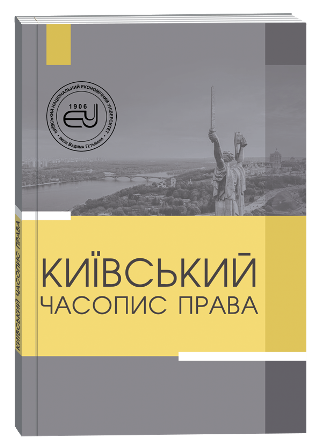SYNERGY OF ADMINISTRATIVE, JURIDICAL, AND INSTITUTIONAL POLICIES FOR SUCCESSFUL IMPLEMENTATION OF TRANSBORDER COOPERATION IN HIGHER EDUCATION IN UKRAINE
DOI:
https://doi.org/10.32782/klj/2021.1.11Keywords:
migration process, public administration, higher education, internationalization of higher education, UkraineAbstract
Due to the fact that Ukraine is at the same time the country of origin, destination and transit of migrants, the territory of various scales, characters and vectors migratory flows, it appears difficult to ensure the overall sound State regulation in the field of migration. The solution requires a comprehensive and systematic approach. Among all the factors influencing the public administration of migration processes, its legal background, the issue of the impact of university education on the attraction of foreign capital (in various forms) for the progress of the nation is of the highest interest in this survey. The academic publishing on public administration traditionally emphasizes the theories or mechanisms of management and governance. Significant part of the researchers is considering topical issues by sectors of the public administration system. But nowadays societal development needs multilevel solution with engagement of different fields providing a synergy on administrative, managerial and institutional potential of the State. Equally, sound public administration in one field will boost some other fields and it underlines the necessity of adequate qualification, competences and experience of the policymakers and public administrators. Indeed, in the given paper we provide analysis of interdependence of the migration and educational processes with close consideration of common impact on the development of other sectors of societal life. It is proven that there is a causal link between the educational processes, lawmaking and public administration activity in framework of the migration monitoring and governance. The synergy of the state bodies’ efforts shapes its image, attractiveness for foreigners and, thus, the economic growth. Thus, the cross-disciplinary analysis of a complex set of forces led to the fact that adequate migration policy is needed in order to ensure effectiveness of the internationalization policy, to revive national economics, to preserve the managerial potential of the State.
References
De Wit, H. (2012). Student mobility between Europe and the rest of the world: Trends, issues and challenges. In A. Curaj, P. Scott, L. Vlasceanu & L Wilson (Eds.), European higher education at the cross roads: Between the Bologna Process and national reforms (pp. 431-439). Dordrecht: Springer.
Findlay A.M., King R., Smith F.M., Geddes A., Skeldon R. (2012). World class? An investigation of globalization, difference and international student mobility. Transactions of the Institute of British Geographers, 37, 118-131.
Holovatyi, M. (2014). Multiculturalism as a means of nations and countries interethnic unity achieving. Economic Annals-XXI, 11-12, 15-18.
Holovatyi, M. (2015). The state and society: The conceptual foundations and social interaction in the context of formation and functioning of states. Economic Annals-XXI, 9-10, 4-8.
Kostiuk, T. (2016). Higher Education to Export: Requirements of Internationalization to the Public Administration System. Public Administration: Improvement and Development, 1. URL: http://www.dy.nayka.com.ua/?op=1&z=1296.
Kostiuk, T. (2016). International academic mobility: current and perspective issues in the field and public administration. Public Administration: Improvement and Development, 10. URL: http://www.dy.nayka.com.ua/?op=1&z=1298.
Kostiuk, T. (2018). Differentiation of approaches to the determination of student mobility/ migration phenomenon in educational and scientific discourse. The State and the regions, 4(64), 82-86.
Madge C., Raghuram P., Noxolo P. (2009). Engaged pedagogy and responsibility: a postcolonial analysis of international students. Geoforum, 40, 34–45.
Mosneaga A, Winther L. (2013). Emerging talents? International students before and after their career start in Denmark. Population, Space and Place: this issue.
Parey M., Waldinger F. (2011). Studying abroad and the effect on international labour market mobility: evidence from the introduction of Erasmus. The Economic Journal, 121, 194–222.
Teichler, U. (1997). The British involvement in European higher education programmes: Findings of evaluation studies on Erasmus, Human Capital and Mobility and Tempus. In The Thirtieth Anniversary Seminars (pp. 39-64). London: Society for Research into Higher Education.
Teichler, U., Ferencz, I. & Wächter, B. (Eds.) (2011). Mapping mobility in higher education in Europe. Volumes 1 & 2. Bonn: Deutscher Akademischer Austauschdienst.
Teichler, U. & Janson, K. (2007). The professional value of temporary study in another European country: Employment and work of former Erasmus students. Journal of Studies in International Education, 11 (3/4), 486-495.
Teichler, U. The impact of temporary study abroad. URL: http://www.eurosla.org/monographs/EM04/Teichler.pdf.
Svyrydenko, D. (2014). Academic Mobility: The Answer to the Challenges of Globalization. Kyiv. 2014.
Zyzhko, T. (2010). Academic mobility as an objective condition for the development of university education. Bulletin of the Institute for the Development of the Child. Series: Philosophy. Pedagogy. Psychology: Collection of scientific works, 10, 6-10.







